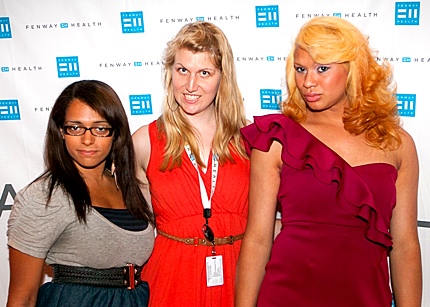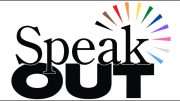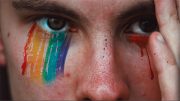
Emilia Dunham, center, at the Project LifeSkills first “Skillz Ball” held on Friday, July 13th. The event celebrated the efforts of local organizations serving LGBTQI youth and raised awareness of LifeSkills, an empowerment-focused research study for transgender women ages 16-24.
Photo by: Glenn Koetzner/TRT
By: Brook Rosini/Special to The Rainbow Times–
The LifeSkills Project, a program for and by transgender women at the Fenway Institute, is making the news and recruiting new participants too. The Rainbow Times, TRT, interviewed its Senior Research Associate, Emilia Dunham.
Dunham, who besides being a crucial member of LifeSkills, is also active in other LGBT local organizations explained why LifeSkills is unique, and how it will positively affect trans people and LGBTQ communities in Boston, Chicago, and across the country.
TRT: Your resume shows a history of impressive work with the LGBTQ community. How did you get involved with the community and this work, and what drives you to continue with it?
Emilia Dunham: First, thank you for the opportunity to be interviewed for this paper. I’ve been following the publication for years, and it’s an honor to be interviewed and have the chance to talk about the LifeSkills study being conducted at The Fenway Institute at Fenway Health. Thanks for the kind words too! I became involved with the LGBTQ community quite naturally several years ago as a transgender and bisexual-identified youth in a small Massachusetts high school. Experiencing and watching my LGBTQ peers experience LGBTQ-related discrimination, bullying, family and peer rejection, poor school performance, depression, and other issues was and continues to be a motivating factor for why I work to make the world a better place for LGBTQ youth. It just goes to show how much work we need to do, when it’s still so challenging growing up in Massachusetts.
Q. How does the LifeSkills project fit into your goals for positively impacting LGBTQ youth?
A. LifeSkills is a prime example of a project that positively impacts these communities. LifeSkills is a research study for young transgender women ages 16-24 testing a group intervention designed and led by other trans women to empower participants and reduce sexual risk behaviors. This study recognizes the unique needs and lives of the girls, and our hope is that this study will make a difference at such a critical time for a population that deserves more services. Ultimately, the study will lead to more information about the community, create opportunity for more trans programming across the country, and work at fostering community right here in Boston.
Q. What are some of the challenges in getting individuals and city/state governments to support programs like LifeSkills?
A. As you said, the challenges facing programs and research studies like LifeSkills are complicated. It really makes you wonder how much our communities need to suffer before those in power see that LGBTQ youth are in a crisis. Some of the main arguments governments give for their reluctance in funding LGBTQ youth projects is lack of research and data on LGBTQ health disparities, and there is even less research on transgender youth. However, LifeSkills seeks to add to that research and hopefully prove to be a successful program that governments could fund in cities and states across the U.S.
Q. People involved with the community know about the constellation of challenges facing LGBTQ youth, like the shocking homeless rate, which contributes to distressing health impacts ranging from substance abuse problems and high-risk sexual behavior, to soaring STI and HIV infection rates, to high suicide risk. What are some of the challenges in raising awareness about these issues?
A. Some of the organizations I am involved with contribute to the important work of raising awareness to the myriad challenges facing LGBTQ youth. For instance, both the Massachusetts Transgender Political Coalition (MTPC) and the Massachusetts Commission on GLBT Youth have held public hearings in the past months raising awareness of the needs of transgender and GLBT youth. MTPC’s years of advocacy have paid off, as evidenced by the passage of the Trans Equal Rights Law that went into effect just this month (on July 1). However, there’s more work to be done to raise awareness of trans realities, achieve public accommodation protections, and ensure agencies update and enforce their policies and protections for trans people. MTPC is running a fabulous awareness raising campaign called “I AM: Trans People Speak” (www.transpeoplespeak.org/). I urge you to check it out.
Recently, the Commission held hearings at the Boston Statehouse (June 20) and in Holyoke, MA (June 21), where testimony urged state officials to support more LGBTQ programming and services. Public testimony brought most of us to tears, and touched on issues around LGBTQ youth homelessness, education, families, healthcare, and many other concerns. The Commission and MTPC continue to make policy recommendations to state agencies and raise awareness through these events and through reports in the media. I encourage readers to become involved with these organizations to help with this important work.
Q. The LifeSkills website is well put together, intuitive, and informative. I imagine accessibility is a key part of the project – making user-friendliness of the website very important. Can you talk a bit about your online presence?
A. Thanks for noticing our website! We are very pleased with it. LifeSkills Research Associate Bianca Aponte put us in touch with Ben Mauer and the Quilted team (quilted.coop) who built a wonderful, pretty website based on our needs. It’s incredibly important to have a strong online presence. With youth, while there are certainly issues of computer access, for some because of trans related discrimination in the world, the internet is the number one place they receive their news and make connections.
Q. Similarly, it seems like holding high-visibility events like the Skillz Ball must be crucial to accessibility and awareness. Can you talk a little bit about how the Ball worked?
A. One challenge we faced with outreach is that there aren’t as many spaces for young trans women to hang out, so we decided to create a space for our community to not just promote the study, but also to give back to the community. This was precisely the objective of the Ball. Seeking to engage the community, we used a unique strategy of asking performers in the Ball to walk (meaning to perform) for an organization that serves transgender youth, as a way for them to give back to the organizations they care about. Each performer who won a category won $50 and the organization with the most category wins received a $500 donation from Fenway Health.
We reached out to the major LGBT organizations serving youth in the area including MTPC, BAGLY, TransCEND/Youth on Fire/AAC, Boston GLASS/JRI, HBGC, the MAC, Network La Red, among others. Each promoted the event and many sent performers to represent their organizations.
Importantly, we worked with Jaisyn Prodigy, father of the House of Prodigy, who promoted the event in the ball community and advised us on how to make this a success. As a result we had a wonderful showing of attendees from various organizations across our communities.
Oh, and also BAGLY, a veteran in throwing balls, swept the categories and received the $500 award!
TRT has some fabulous pictures and we also have other amazing pictures by photographer Jenn Alton, who volunteered her services and got some fierce shots. All the photos are up on the Facebook page: www.facebook.com/lifeskillsboston.
Lastly, in addition to attending and partnering on community events, going to support groups and club venues, and doing online recruitment via Facebook and Craigslist, we also have a Community Referral Program so that if someone knows people who potentially meet eligibility, they can get money for those that enroll. There is more information about the Community Referral Program on our blog: www.projectlifeskills.org/blog/introducing-lifeskills-community-referral-program.
Q. Speaking of the LifeSkills website, it states that the LifeSkills study is a “client-centered, community-based research study ‘with” not “on” trans communities.” Why is that an important distinction to make?
A. LifeSkills is not just a study that puts up fliers on the subway or posts in the newspaper, and then waits for participants to show up. There is definitely a time and a place for that, but trans people, even young trans people, are sometimes excluded from research or are subject to insensitive, purposeless research that makes them feel like guinea pigs. Engaging with the community lets participants know that we actually care about them and support their communities. Our care and support for community members extends beyond the immediate community, for instance with the Ball, and also includes supporting the events of other community organizations.
Q. What are other ways the LifeSkills study is different from others?
A. What’s unique about this project is that most of the staff members are transgender, including all of the Research Associates/Group Facilitators. The reason for this is that we know young trans women often feel more comfortable talking about sensitive topics with people who can relate to what they are going through. The staff make-up, along with the content of the intervention, are specific to the needs of young trans women, so when we talk about having safer sex, or looking for a job, or how to handle discrimination on the fly, or how to disclose that you are transgender, it’s specific to our community.
Q. I’m actually based in Chicago right now, where the city has recently stepped up efforts to support the LGBTQI community with special programs and interventions. I’m curious about the relationship of the LifeSkills Chicago team and the LifeSkills Boston team. How did that come about?
A. I did notice that you’re based in Chicago. What a cool coincidence! We were just in Chicago last December for a training in the intervention/facilitation manual. The manual was actually developed in Chicago by transgender women, including Vea Cleary, who led the training for our teams last winter. Dr. Rob Garofalo was the Investigator on this pilot project that ran a few years ago and he has led several other transgender research studies over the years.
You’re right, there seems to be great progress for support of the LGBTQ community in Chicago, and thanks to Dr. Garofalo, Dr. Lisa Kuhns, and the rest of the Chicago team, they appear to have led the way with research with young trans women. When Dr. Garofalo’s team decided to pursue LifeSkills as a larger grant with the National Institutes for Health, they sought a strong LGBT research institute and researchers experienced in trans research: Matthew Mimiaga and Sari Reisner here at The Fenway Institute, the Investigators on the Project. They had worked together on other projects, so it was a natural partnership.
While I’m naming names, if I may I’d like to make a shout out to the other fabulous staff on this study. The team is truly amazing, and I am just one person on a team of extremely talented individuals including: Bianca Aponte, Nelisa Rash, Jackie White, Sari Reisner, Matthew Mimiaga, Laura Potter and Mick Rehrig.
Q. So, related to that, why Chicago and Boston? Do they simply have the right facilities equipped for this kind of study, or are they cities that have a particular need because of their specific communities?
A. Boston and Chicago certainly boast some of the best LGBT health research facilities in the country. In terms of need, there is need in every city and town for trans services, but it was important to test whether this intervention could work in another city. It will be interesting to compare strengths and challenges of each city to know how the intervention could be used in other cities down the line. That will be the true test!
Q. There are a number of partnerships involved in LifeSkills, beyond the Chicago-Boston one and their affiliations with the Ann and Robert H. Lurie Children’s Hospital of Chicago and Fenway Health/Fenway Institute in Boston. Can you speak to the importance of partnerships for LifeSkills?
A. I can’t stress enough how partnerships are the key to a successful study, particularly with a community project such as LifeSkills. We were fortunate to have the sponsorship of Fenway Health, Brigham and Women’s Hospital, Dr. Jeffrey Spiegel, and Crazy Dog Photography, as well as in-kind donations and services to help fund the Ball. We only have so much capacity as a research study, so we truly appreciate the support to actually put on events that help us build needed community connections.
Beyond that, we would never be able to perform this research if it weren’t for funders. Research of any kind requires funding to be successful, especially when you’re enrolling as many as 400 participants and following each for over a year. Many researchers apply for funding from the government or private institutions, which is what the Investigators did through the National Institutes of Health (NIH), seeking a five year grant, which they received. The grant was the largest ever to fund a project for this population by the NIH, so you know that they don’t just give these things away, but require you to work at an institution where there is the infrastructure to carry this out. Howard Brown and The Fenway Institute have strong reputations for conducting LGBT health research, and hospital affiliations are fantastic because we are able to recruit directly from health centers that see young trans women.
Q. If possible, could you tell me any stories about LifeSkills participants who are real successes of the program – individuals showing impressive growth as a result of your work?
A. We just finished our first group sessions last month, which were very exciting! Since this a research study, I must protect participant confidentiality, but I’ll say that generally participants seemed to enjoy the groups, feel more empowered, and whether someone enrolls or not we frequently connect girls with useful resources and referrals. Since we just finished our group sessions, our participants will be in the study for another year, so check back in with us in a year and we’ll let you know how it’s going.
Q. What is the next step for you, and what are your dreams for the future of this project, this movement, this community?
A. I’d love to see this project really become successful and make a tremendous impact on the local community and on individual participants, by adding to our knowledge about the trans community and even spurring policy change. Since I’ve been out as transgender I’ve seen so many great changes for the trans community: attitudes are changing, policies are becoming more favorable, and there are finally some positive role models in the media for young trans people to look up to. While there are so many struggles and challenges that young trans women face, what I hope this project will show is the magnificent resilience and true hope and potential these girls demonstrate. Each and every one these women – whether in the study or not – are such powerful, beautiful, wonderful women, capable of incredible things. My dream is that some day, everyone in the world will see that.
To learn more about the LifeSkills project, visit www.projectlifeskills.org/. You can connect with Emilia and the rest of the LifeSkills Boston team on their blog through the website. If you think you know someone who might be eligible to participate in the study, you can find out details of the LifeSkills Community Referral Program, which offers financial compensation for referrals, at www.projectlifeskills.org/blog/introducing-lifeskills-community-referral-program.
An excerpt from this interview will appear in the August 2nd print edition of The Rainbow Times.








emilia forgot to mention how much work Trancend has done for the Trans community. And how much testing and counsling has been provided to the trans community of boston by Transcend.
Thank you Bliss. It’s great to hear from you! You’re right Transcend and other organizations have done amazing work in the community and really blazed the path for our work in LifeSkills. I think I mentioned how we would not have been able to succeed without the support of community organizations, and as I mentioned in this interview we credit organizations like TransCEND for their support in making this event happen. We always encourage our participants to take advantage of the great services at TransCEND.
We also are continuing to plan events for the community and work with TransCEND to make them even more successful. Interestingly enough tomorrow we’re hosting a movie night with TransCEND for trans girls so we’re excited to continue this partnership moving forward: https://www.facebook.com/events/137185619755304/